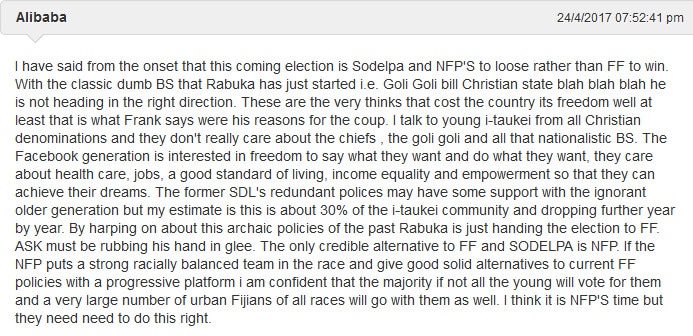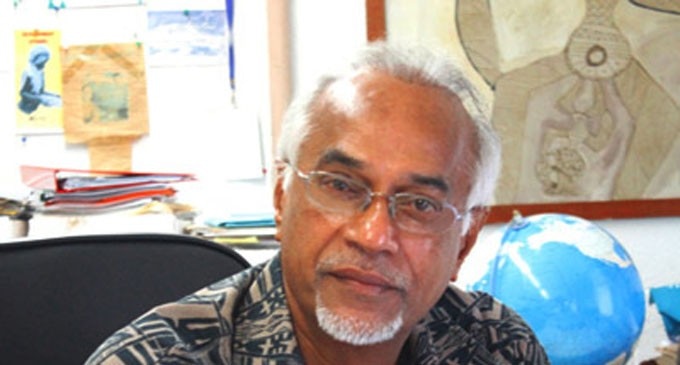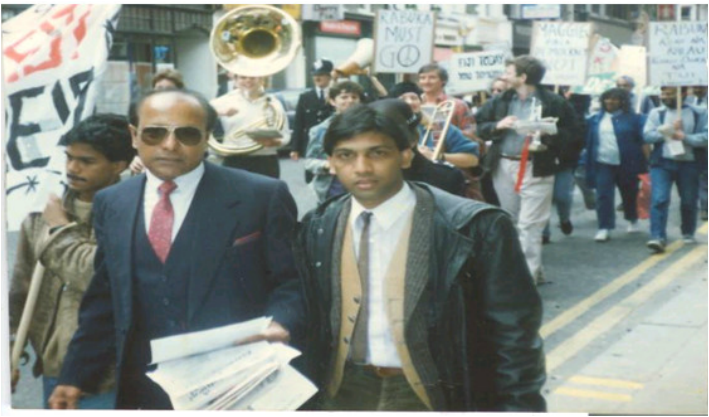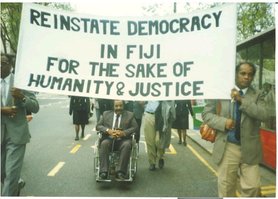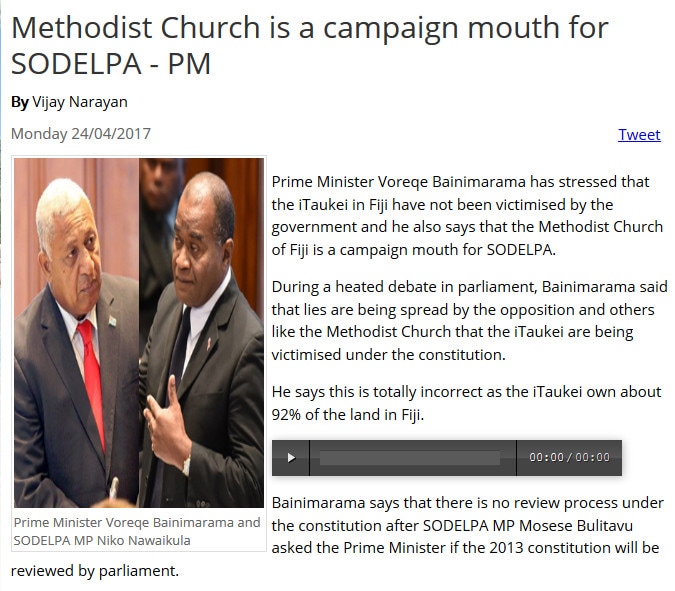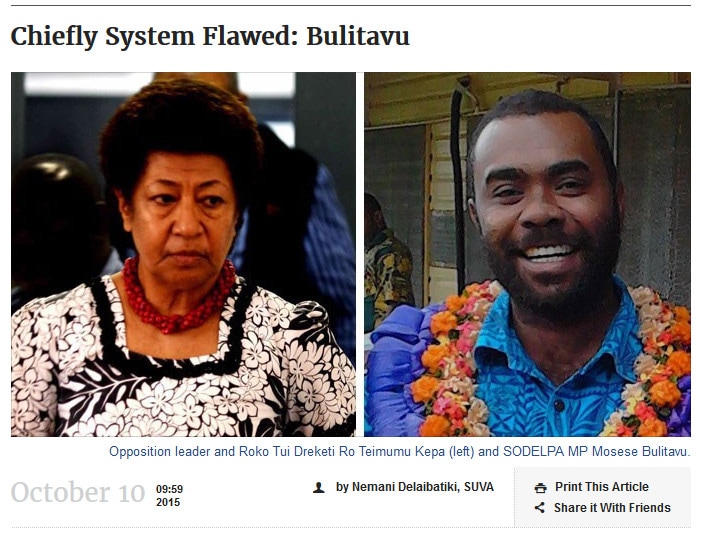Fijileaks: For NFP to be a serious contender (which is quite likely) the party needs a secretary-general who is independent of Kamal Iyer. Baladas comes across as another Praveen Bala to us
Fijileaks to SODELPA and the METHODIST CHURCH: "It is time you informed the nation that if the 2013 Constitution is not reviewed before the general election, no native Fijian will take part in the election process; we have too many chameleons in the cloth of this professor who became one of the Electoral Commissioners only to cry foul after the 2014 election"
The Fiji Times
Monday, April 24, 2017
WITH Fiji's indigenous people accounting for about 60 per cent of the country's population, their concerns will be important in the 2018 General Election.
Also, political parties need to play their cards well if they want to get their votes.
Professor Vijay Naidu, of USP's school of Governance, Development and International Affairs, made reference to the 2014 General Election, saying Fiji's ethnic minorities voted overwhelmingly for the ruling FijiFirst party and its leader on ethnic lines because the voters wanted "security and safety".
This time, with the iTaukei population likely to be representing the largest category of voters, issues that have been affecting them for some years should be the key focus for political parties, the former electoral commissioner suggested.
These issues include land rights, qoliqoli rights, land rentals and natural resources.
"By virtue of fact, the iTaukei people are the customary owners and for several years, they have been preoccupied about the ownership," he said.
Prof Naidu said the 2018 polls would also be contested over the FijiFirst track record as government over the past four years, and whether or not their policies benefitted citizens equitably in terms of ethnicity, gender, age, geographical regions and whether citizens have enjoyed the freedoms associated with the democratic transition.
He said ethnic voting, religious voting and degree class-based voting would continue in the country.
He said it was "very much incumbent on the political parties to make appeals beyond particular ethnicities to win a wider cross section of votes.
"Citizens have common concerns, which include cost of living, housing, poverty, wages, employment, infrastructure and utilities.
"However, there are ethnic issues such as scholarships, land ownership and access, status of chiefs, perceptions of inequality and poverty and the loss of affirmative action policies which can be used to mobilise support along ethnic lines."
He said there were many advantages of voting along ethnic lines, but its disadvantages were divisive.
"The disadvantage is that voting along ethnic lines can be divisive and work against national unity and solidarity. There are issues that may affect particular ethnic groups which can be given leverage by the ethnically-elected MP.
"The closure of the Penang mill has an ethnic dimension for instance."
Prof Naidu said there were issues with the current single national constituency, which made it nearly impossible for election candidates and MPs to be identified with local communities.
"There might be block voting along ethnic, sub-ethnic and denominational lines, and MPs will know where their votes came from, and who to speak for.
"However, with the presidential type of leader-based electoral arrangement, most MPs tend to be quiet as church mice."
Prof Naidu adds: "With iTaukei being close to 60 per cent of the population, they are likely to be the largest category of voters although their registration as voters does not always correlate with their total population figures."
Fijileaks: Professor Vijay Naidu fails to warn that SODELPA, led by treasonist coupist Sitiveni Rabuka and flanked by many ultra-nationalists (reminiscent of 1987), must NOT be allowed to exploit native issues based on lies and false promises - after all Fiji's "MINI HITLER" and the Methodist GOD's the chosen one - Rabuka - tried to "gas" Vijay Naidu and others in 1988 when he directed his officers and nationalists "to fill up the protestors police cells with diesel fumes"; the entry of Rabuka as political leader has changed the election game and Naidu is failing in his duty to warn us to keep up our guards
1988 coup protest and a night at the Police Station
On the first anniversary of the 1987 coup, a group of USP academics and other activists (including some Catholic priests) protested at the Sukuna Park. A “Group of 18” (including a certain Aiyaz Khaiyum) was arrested and put into the cells for the night, where in the middle of the night, while they were singing Fiji’s national anthem (and in the morning they sang Cat Stevens’ “Morning has Broken”), they faced diesel fumes being directed through their cell windows. The 18 comprised three Catholic priests, seven USP and associated staff, volunteer social workers, students, and a technician from FM96. We university lecturers, were (in order the names appeared in the Fiji Times front page news item:
Amelia Rokotuivuna Atu Bain Arlene Griffen Peni Moore
Patricia Jalal Jane Ricketts Debbie Mue Emma Druavesi
Judith Denaro Vijay Naidu Wadan Narsey Fr Tom Rouse
Fr Paul Tierney Fr John McEvoy Kenneth Zinck Radha Krishna
Aiyaz Khaiyum Larry Thomas
The names are interesting today, simply because so many in this group, so passionately opposed to the 1987 coup, became supporters of the Bainimarama military coup. What a fantastic research topic this would be.
There was social outrage. Fiji Times bravely fired off an Editorial expressing great concern. Lawyers Mehboob Raza, Sir John Falvey, Sidik Koya and Miles Johnson fronted up to represent the 18 in court (a commitment to ethics that is somewhat missing in the Fiji Law Society today).
Judge Davendra Pathik ruled that the 18 had “wilfully and unlawfully held a meeting at Sukuna Park without a permit”. Nevertheless, he granted the 18 “an absolute discharge without conviction bearing in mind the mitigating factors…. you are to be commended for your lofty ideas… freedom of speech and association was guaranteed for every citizen…”.
Compare these views of Judge Pathik in 1988, with his pro-Bainimarama judgments after the 2006 military coup.
https://narseyonfiji.wordpress.com/2016/07/29/usp-academics-in-the-1980s-political-storms/
